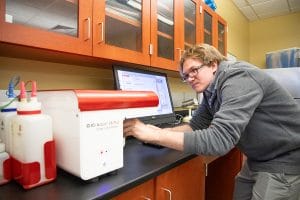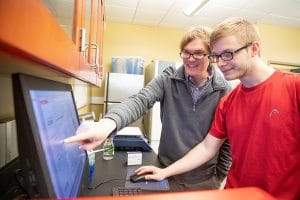
McDermott used the funding to purchase a flow cytometer for the Department of Biology. The state-of-the-art machine will greatly enhance the research opportunities available to undergraduate science students at SAU.
“I didn’t learn flow cytometry until I was in graduate school,” said McDermott, a first-year faculty member at SAU. “For our undergraduate students to be able to say that they know flow cytometry is a great advantage. We are probably one of the very few undergraduate institutions in Arkansas to have a flow cytometer.”
The machine expands the number of research projects that can be done by students as well as faculty. “It is an essential tool for studying the immune system,” McDermott said. “Getting a tool like this opens up new projects for any professor or student.”
Flow cytometry is a cutting-edge technology that has numerous applications that can be applied to the wide variety of fields of biology that are taught and researched at SAU. It is capable of analyzing thousands of cells in a matter of seconds as compared to a microscope, which limits the number of cells in the field of view. The flow cytometer increases both quantitative power and time efficiency.
It comes with a computer workstation and user-friendly software that will make it easy to train both faculty and undergraduates.
For students, it will mean hands-on experience with flow cytometry and a greater opportunity to publish academic papers. “Medical and dental schools require more and more undergraduate research, and the Biology Department is always looking at ways of expanding those opportunities,” McDermott said.
The machine fulfils the Biology department’s mission of incorporating the latest technologies into the classroom and research experience at SAU. “The more tools you have to answer a problem, the better,” he said. “We want to increase our arsenal to allow our students to do everything they need to here at SAU.”
INBRE is a valued funding source for SAU. “Normally, a flow cytometer would be unobtainable for us, but having a source dedicated to undergraduate institutions like SAU is absolutely vital,” McDermott said. “We have had success with INBRE in the past and I definitely plan on pursuing other grants in the future.”
“INBRE instrumentation grants are very competitive; it is incredible that Dr. McDermott has been able to secure one within just a few months of his appointment in the Biology Department,” said Dr. Abdel Bachri, dean of the College of Science and Engineering. “This speaks very highly of the quality of his research ideas, and makes him a productive and promising undergraduate research mentor. I look forward to witnessing his accomplishments with our students.”
The grant was made possible by The Arkansas INBRE, which is funded by a grant from the National Institute of General Medical Sciences under the Institutional Development Award (IDeA) Program of the National Institutes of Health (NIH). Dr. Antoinette Odendaal, assistant professor of Biology and Chemistry, recently secured an INBRE grant in the amount of $20,000 for a pilot study. She also contributed to an Arkansas INBRE Shared Research Grant in 2016, for which SAU required a motorized fluorescence microscope with a camera capable of capturing fluorescence and bright field images.

